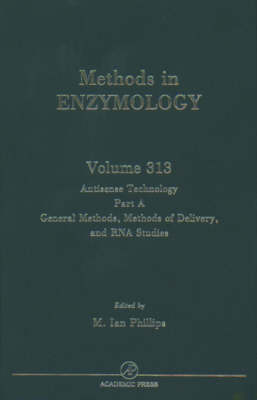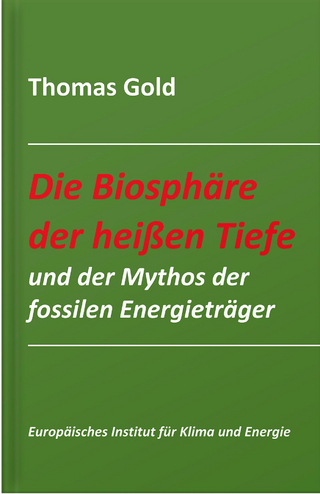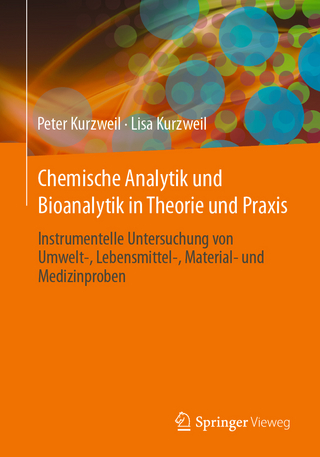
Antisense Technology, Part A, General Methods, Methods of Delivery, and RNA Studies
Academic Press Inc (Verlag)
978-0-12-182214-9 (ISBN)
Antisense technology is the ability to manipulate gene expression within mammalian cells providing powerful experimental approaches for the study of gene function and gene regulation. For example, methods that inhibit gene expression permit studies which probe the normal function of a specific product within a cell. Such methodology can be used in many disciplines such as pharmacology, oncology, genetics, cell biology, developmental biology, molecular biology, biochemistry, and neurosciences. This volume will be a truly important tool in biomedical-oriented research.
The critically acclaimed laboratory standard for more than forty years, Methods in Enzymology is one of the most highly respected publications in the field of biochemistry. Since 1955, each volume has been eagerly awaited, frequently consulted, and praised by researchers and reviewers alike. Now with more than 300 volumes (all of them still in print), the series contains much material still relevant today--truly an essential publication for researchers in all fields of life sciences.
General Methods:
S.T. Crooke, Progress in Antisense Technology: The End of the Beginning.
M.I. Phillips and Y.C. Zhang, Basic Prinicples of Using Antisense Oligonucleotides in Vivo.
T.E. Saison-Behmoaras and S. Dheur, Polyethyleneimine-Mediated Transfection to Improve Antisense Activity of 3'-Capped Phosphodiester Oligonucleotides.
J.-C. François, J. Lacoste, L. Lacroix, and J.-L. Mergny, Design of Antisense and Triplex-Forming Oligonuceotides.
R.V. Giles, D.G. Spiller, and D.M. Tidd, Chimeric Oligodeoxynucleotide Analogs: Chemical Synthesis, Purification, and Molecular and Cellular Biology Protocols.
P. Iversen, C. Ghosh, D. Stein, and D. Weller, Evaluation of Antisense Mechanisms of Action.
P.-M. Lledo, D. Desmaisons, A. Carleton, and J.-D. Vincent, Physiology and Molecular Biology Brought to Single-Cell Level.
P.E. Nielsen, Antisense Properties of Peptide Nucleic Acid.
M.W. Reed, D. Milesi, I. Kutyavin, E.A. Lukhtanov, V.V. Gorn, Synthesis of Oligonucleotide Conjugates in Anhydrous Dimethyl Sulfoxide.
P.A. Morcos, Gene Switching: Analyzing Broad Range of Mutations Using Steric Block.
I. Robbins and B. Lebleu, Vesicular Stomatitis Virus as Model System for Studies of Antisense Oligonucleotide Translation Arrest.
Y.S. Sanghvi, R.R. Deshmukh, and D.L. Cole, Purification of Antisense Oligonuceleotides.
B.R. Shaw, D. Sergueev, K. He, K. Porter, J. Summers, Z. Sergueeva, and V. Rait, Boranophosphate Backbone: A Mimic of Phosphodiesters, Phosphorothioates, and Methyl Phosphonates.
J. Piulats, G. Tarrzsón, D. Bellido, R. Eritja, and S. Vilaró, Intracellular Distribution of Digoxigenin-Labled Phosphorothioate Oligonucleotides.
E. Uhlmann, A. Peyman, A. Ryte, A. Schmidt, and E. Buddecke, Use of Minimally Modified Antisense Oligonucleotides for Specific Inhibition of Gene Expression.
Methods of Delivery:
C.A. Stein, L. Benimetskaya, and J. Tonkinson, Determination of Cellular Internalization of Fluorescent Oligonucleotides.
P.O.P. Ts'o, R.J. Duff, S.F. Deamond, C. Roby, and Y. Zhou, Intrabody Tissue-Specific Delivery of Antisense Conjugates in Animals-Ligand Linker-Antisense Oligomer Conjugates.
S.C. Semple, S.K. Klimuk, T.O. Harasym, and M.J. Hope, Lipid-Based Formulations of Antisense Oligonucleotides for Systemic Delivery Applications.
R.L. Juliano, J. Hughes, A. Astriab, H. Yoo, S. Alahari, E. Liang, D. Sergueev, and B.R. Shaw, In Vitro Transport and Delivery of Antisense Oligonucleotides.
A. Matsuno, T. Nagashima, H. Katayama, and A. Tamura, In Vitro and in Vivo Delivery of Antisense Oligodeoxynucleotides Using Lipfection: Application of Antisense Technique to Growth Suppression of Experimental Glioma.
A.M. Tari, Preparation and Application of Liposome-Incorporated Oligodeoxynucleotides.
S.A. Williams and J.S. Buzby, Cell-Specific Optimization of Phosphorothiate Antisense Oligodeoxynucelotide Delivery by Cationic Lipids.
RNA Studies:
J.J. Rossi, D. Castanotto, and M. Scherr, Intracellular Expression and Function of Antisense Catalytic RNAs.
J.M. Dagle and D.L. Weeks, Selective Degradation of Targeted mRNAs Using Partially Modified Oligonucleotides.
G.L. Eliceiri, Reversible Depletion of Specific RNAs by Antisense Oligodeoxynucelotide-Targeted Degradation in Frog Oocytes.
C. Guerrier-Takada and S. Altman, Inactivation of Gene Expression Using Ribonulease P and External Guide Sequences.
E.R. Jakoi and W.L. Severt, Desruption of mRNA-RNP Formation and Sorting to Dendritic Synapses by Antisense Oligonucleotides.
M. Inouye and O. Mirochnitchenko, Antisense RNA and DNA in Escherichia coli.
L.A. Phylactou, C. Darrah, L. Everatt, D. Maniotis, and M.W. Kilpatrick, Utilization of Properties of Natural Catalytic RNA to Design and Synthesize Functional Ribozymes.
R. Kole, H. Sierakowska, L. Gorman, S.-H. Kang, Antisense Oligonucelotides and RNAs as Modulators of pre-mRNA Splicing.
R.H. Silverman, B. Dong, R.K. Maitra, M.R. Player, and P.F. Torrence, Selective RNA Cleavage by Isolated RNase L Activated with 2-5A Antisense Chemeric Oligonucleotides.
| Erscheint lt. Verlag | 1.11.1999 |
|---|---|
| Reihe/Serie | Methods in Enzymology |
| Mitarbeit |
Chef-Herausgeber: John N. Abelson, Melvin I. Simon |
| Verlagsort | San Diego |
| Sprache | englisch |
| Maße | 152 x 229 mm |
| Gewicht | 910 g |
| Themenwelt | Naturwissenschaften ► Biologie ► Biochemie |
| Naturwissenschaften ► Biologie ► Genetik / Molekularbiologie | |
| ISBN-10 | 0-12-182214-1 / 0121822141 |
| ISBN-13 | 978-0-12-182214-9 / 9780121822149 |
| Zustand | Neuware |
| Haben Sie eine Frage zum Produkt? |
aus dem Bereich


